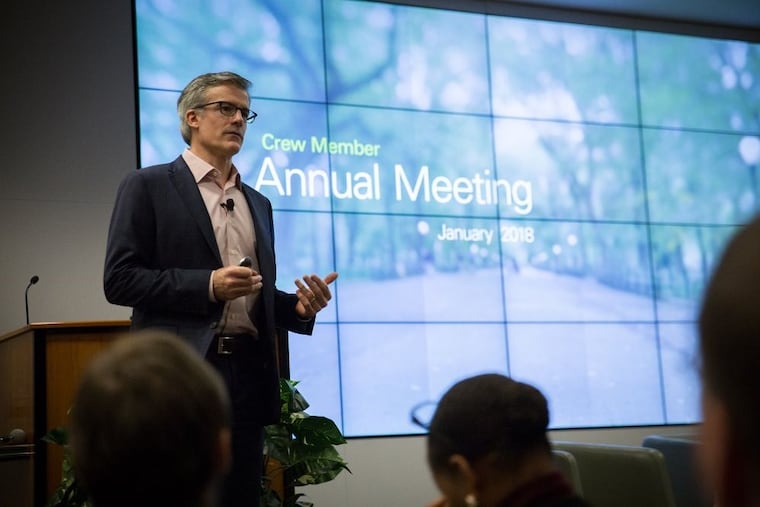Uncertainty tax: Why Vanguard bigwigs expect economic growth to slow in 2020
Read excerpts from the presentation by Vanguard's two top executives and their answers to questions from investors on a webcast.

Vanguard’s top executives held a webcast Thursday evening addressing key factors that could affect the U.S. and global economies, trends to watch for in the financial markets, and what’s new for Vanguard clients in 2020.
“We’ve seen a significant rally last year, so for returns in bonds, we expect overall 2-2.5% over the next decade” annually, said chief investment officer Greg Davis on the one-hour program. For U.S. equities, Vanguard expects annual returns of slightly under 5% and international equities of 7.5% annually.
Vanguard investors “tend to be lighter in international equities than we would like,” said Vanguard chief executive Mortimer “Tim” Buckley, and the firm recommends rebalancing portfolios for those with big gains in U.S. equities.
On recession odds:
“Our economic outlook talks about an age of uncertainty. We haven’t had blistering economic growth. It’s been slow and steady, a little better last year, [and] we expect to slow down to 1% growth” this year, Buckley said.
“Why? It’s because of the uncertainty. We talk about an uncertainty tax when policy uncertainty is high, when people are uncertain about Brexit, trade wars, tensions in Iran. Businesses don’t invest. If they don’t invest going forward, it’s tough to grow. So we expect slower growth than in the past,” Buckley said.
On China:
Vanguard also expects China’s economy to slow down and dip below 5.8% growth. Said Davis: “We’re starting to see a slowdown in China, but it’s been growing at 6%, now it’s in the high 5%, whereas global economic growth is 3-3.5% or so. China has a lot of debt, a lot of leverage can have negative consequences.”
On 2020 elections in the U.S.:
How will that impact the markets? “We’ve done some work over time on how they affect markets. A typical election year increases the level of uncertainty. That’s another dimension added to the uncertainty tax. Over the past 150 years, it doesn’t matter who’s in office, whether there’s a Democrat or Republican in the Oval Office. You might see increased volatility,” Davis said.
On cybersecurity at Vanguard and what’s new for clients in 2020:
Cybersecurity is "our biggest investment every year. We always have to have that awareness. We’re always under attack,” Buckley said.
On what’s new in 2020, clients will “benefit from lower expenses. We’ll have new capabilities around advice and $1 billion invested in existing and new services. We’ll give you funds that outperform the competition, wrap it in great service. We lower expenses year after year, so clients keep more of their return,” said Buckley.
“We have Personal Adviser Service (PAS), which stands at $150 billion in assets and growing at 30% a year. It’s full financial advice, financial planning with a CFP. It’s a virtual relationship. It costs 0.30% or a 70% discount from what’s in the marketplace. We’re enhancing that more," he added.
Vanguard has a pilot Digital Adviser program currently, and “we’re rolling it out this year.”
On low-cost investing:
“It costs you about 0.09% to invest with Vanguard. When you go other places, how are they making their margins? We operate as close to cost as we can,” said Buckley.
Vanguard possibly offering alternatives such as private-equity funds:
There has to be a logic behind it. There has to be a client need. In private equity, if you look at endowments and foundations, it has been a great diversifier. But it’s tough to offer in a fund. It has to add value. We like to be the best. We gotta make sure we can offer you better prices and access to better managers. It’s not until we pass all those tests that we’ll offer something in the space."
On index funds’ corporate governance, market dominance:
“A lot of this is around governance. With the success of Vanguard, we own about 8% of every company in the U.S., that makes us one of the largest shareholders,” Buckley said. “We have a fiduciary duty to maximize returns of our clients. We take that duty very seriously. We have a team of people who pore through proxies to identify how these companies are being run,” including board composition, pay, and other metrics.
“Controversy comes up say, when a company is a polluter, they’re a big pharmaceutical company selling opioids. In our active business, the active manager can tell the company what to do. In indexing, we’re not looking to influence the strategy, we want to own the whole market. We want companies to address the underlying risks. We want to know the board and management have addressed that risk. There may be litigation. We want to know what the strategy is -- we won’t tell them if it’s right or wrong,” Buckley said.
Is indexing too big? “It’s still a small part” of the market, Davis said. “The majority of indexing represents less than 20% of the overall equity market. It’s less than 5% of daily trading volume.”
A full transcript and replay of last year’s webinar is available on Vanguard’s website. Here are links to Vanguard’s recent webcasts:
How to make retirement saving work for you — Nov. 21, 2019
Year-end is approaching. What our advisors want you to know — Sept. 26, 2019
Preparing for the unexpected: Why spouses and partners should plan together — Sept. 23, 2019
How to choose the right investments for you — June 20, 2019